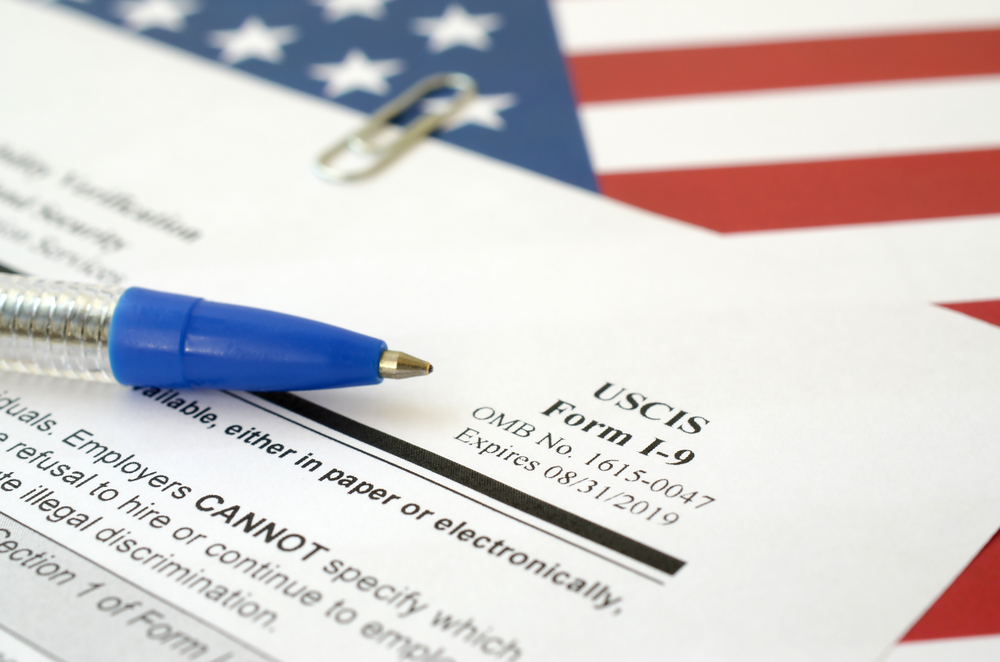An employer should have bargained with a union over the effects of its decision to require employees to complete new I-9 forms, a National Labor Relations Board (NLRB) administrative law judge (ALJ) recently ruled. The decision serves as a reminder of the broad scope of the duty to bargain under the National Labor Relations Act (NLRA).

Frontier Communications Corporation provides telecommunications services. In 2010, it purchased several Verizon properties, including locations in West Virginia where the nonsupervisory employees were represented by the Communications Workers of America, District 2-13. It assumed Verizon’s collective bargaining obligations at the time of the 2010 transaction. As of 2019, there were approximately 1,300 employees in the bargaining unit, spread across 100 work locations in Virginia and West Virginia.
In 2013, Frontier discovered it didn’t have I-9 immigration forms for most of the former Verizon employees. It therefore requested they complete new I-9 forms. When the union found out about the request, it met with the company, and they both agreed Frontier would get new I-9 forms but not retain the supporting documentation.
In late 2018, Frontier conducted an internal I-9 audit and discovered extensive noncompliance. It determined it needed to obtain new I-9 forms and supporting documentation from approximately 95% of all employees hired between 1986 and 2018. On July 19, 2019, it notified its employees of the need to submit new I-9 forms and directed them to do so through I-9 Advantage, its new electronic I-9 provider.
Frontier didn’t notify the union it intended to ask employees for additional I-9 information in 2019. Instead, the union found out about it from employees. It requested to bargain with the company about the new I-9 compliance initiative, but the company refused.
Frontier argued it was “not required or permitted” to bargain over decisions related to compliance with federal immigration statutes. The union filed an unfair labor practice charge, and the matter proceeded to a hearing before ALJ Geoffrey Carter.
ALJ’s Decision
In a decision issued on October 14, 2020, Judge Carter ruled Frontier violated the NLRA by refusing to bargain with the union over the effects of its 2019 decision to require bargaining unit employees to provide new I-9 forms and supporting documentation.
The ALJ found Frontier’s requirement that employees submit new I-9 forms was a mandatory subject of bargaining. He ruled the company’s position that it wasn’t required to bargain over the decision arguably had merit because the I-9 forms weren’t in compliance and it was required by immigration law to have valid forms for each employee. Just because it had an obligation to comply with federal immigration law, however, didn’t excuse it from bargaining with the union over how compliance would be achieved.
For example, the amount of time Frontier would give an employee to obtain and present required documents and the process that would apply to employees who had difficulty presenting appropriate documentation in the allotted timeframe were issues that could be addressed through collective bargaining with the union. Frontier Communications Corp., JD-42-20 (Oct. 14, 2020).
Takeaways
Employers that have collective bargaining obligations with unions are often surprised by the extent of the legal obligation. With a new “prolabor” president in office, this case is a good reminder of the obligation.
Even though you may be required to do something by federal, state, or local law, your legal obligation doesn’t necessarily absolve you of your obligation to be willing to discuss with the union the manner in which compliance will be achieved.
Franck G. Wobst is a labor and employment attorney with Porter Wright Morris and Arthur in Columbus, Ohio. You can reach him at fwobst@porterwright.com.
